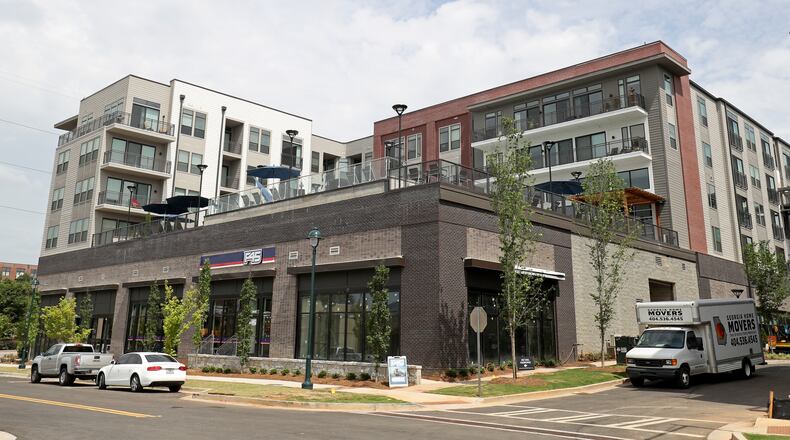Sandy Springs’ Diversity and Inclusion Task Force wants the city to accelerate its work on affordable workforce housing, but the city is delaying, saying it needs a better grasp on changes brought by the pandemic.
The task force is pushing the city to create a zoning law that would require new multifamily developments set aside 10-25% of units as affordable housing for lower-income residents.
Known as “inclusionary zoning” the law exists in other cities around the metro area. Typically, inclusionary zoning laws mandate developers set aside a guaranteed percentage of all the units they build for people whose annual earnings are below their area’s median income.
Olivia Rocomora, chair of the Diversity and Inclusion Task Force’s housing sub-committee, said the city’s inaction is hurting residents. Inclusionary zoning would be one of many steps that should be taken to address the issue, she said. She’s also planning to recommend the city hire a housing director who is an advocate for racial equity and would oversee all types of new development.
“They’re not acting like this is an emergency and it is an emergency because the pandemic has escalated even more,” Rocomora said.
For years, Sandy Springs city officials have discussed the need for affordable housing that would benefit local teachers, first responders and other people who can’t afford to live in the city.
A study of the city’s housing needs completed last year found renters earning less than $55,000 per year are leaving Sandy Springs because they can’t find affordable homes. The study warned that the shortage of affordable homes could make it a less attractive destination for employers of jobs at all income levels.
The second phase of that study, intended to help the city craft an affordable housing policy, was put on hold in January. Mayor Rusty Paul told The Atlanta Journal-Constitution that before it can be completed, local officials must figure out how the pandemic has redefined jobs, the workplace and housing.
“...We have huge labor shortages,” Paul said. “We need to be focused on job challenges.”
In phase one of Sandy Springs’ housing study, HR&A Advisors found 81% of single-family homes in the city sell for more than $400,000.
The median income in Sandy Springs is $78,613 according to the U.S. Census, but Diversity and Inclusion Task Force members say people earning $100,000 per year or less can’t afford to buy a home in Sandy Springs.
The outlook isn’t much better for renters. Sandy Springs’ average rent is $1,533 a month for a 996-square-foot apartment, according to RentCafe.com, which is up 6% from a year ago.
Rocomora said she is one of those who can’t afford to live in the city. She is a resident of Tucker and teaches Spanish and English at The Weber School in Sandy Springs.
“We lose incredible teachers every year because they can’t do the commute anymore,” she said. “Everyone benefits if we can work this out.”
The inclusionary zoning law suggested by the task force is similar to one passed by Brookhaven in DeKalb and other metro Atlanta cities since 2018.
Brookhaven’s zoning code requires 10% of workforce housing to be included in new multifamily developments or projects with mixed housing types, Brookhaven Assistant City Manager Patrice Ruffin said. Currently there are four or five new projects zoned to include workforce housing but they have not yet started construction, Ruffin added.
Melanie Couchman, of Sandy Springs Together (SST) and an advocate for housing that’s affordable, said she wants Sandy Springs to apply inclusionary zoning to existing apartment communities that undergo renovations.
“We currently have — at least on the north end (of the city) — 1,600 apartment units undergoing renovation,” Couchman said. “The likelihood of those rents going up even higher is going to happen. The city could implement inclusionary zoning for major apartment renovations to ensure that at least some renters have affordable rents for an extended period of time.”
Sandy Springs already has incentives for developers of new housing projects, Paul said, adding that inclusionary zoning is not necessary and comparable to rent control, which Georgia doesn’t allow.
City Council discussed incentives in January to help lower costs for builders and draw them to the city’s north end. And city staff continues to evaluate the use of incentives and tax allocation districts, Sandy Springs spokesman Dan Coffer said via email to the AJC. So far, none of these measures have been presented to City Council for a vote.
At last count, Sandy Springs has about 90 apartment communities. With so many apartment communities in the city, the mayor said he’s considering suggesting a moratorium on new multifamily rental projects to discourage developers from building more luxury apartments. Smaller affordable homes on small lots are needed, he said, including developments funded by Habitat for Humanity and other nonprofits.
“We have to make sure we’re getting the kind of development that everyone wants,” Paul said. “We need more home ownership opportunities for middle class families.”
Some residents who are barely able to pay rent or live in poorly maintained apartment buildings need help now, Rocomora said.
“Clearly residents who are suffering don’t have the luxury of time,” she said. “We want to have a conversation with City Council on how to move forward with affordable housing.”
About the Author
Keep Reading
The Latest
Featured



